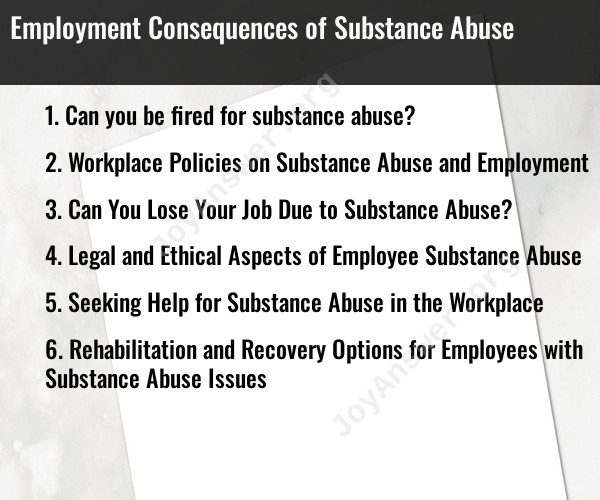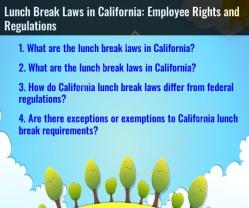Can you be fired for substance abuse?
Employment consequences of substance abuse can vary depending on the employer's policies, local laws, and the specific circumstances of the situation. In many cases, being fired for substance abuse is a possibility, especially if substance abuse affects job performance or violates company policies. Here are some common employment consequences related to substance abuse:
Violating Company Policies: Many employers have specific policies and codes of conduct that prohibit the use of illegal drugs or being under the influence of alcohol or drugs while at work. Violating these policies can lead to disciplinary actions, including termination.
Impaired Job Performance: Substance abuse can lead to impaired job performance, including decreased productivity, increased absenteeism, safety concerns, and errors on the job. Employers may take action if an employee's substance abuse negatively affects their work.
Drug Testing: Some employers conduct random or regular drug testing. If an employee fails a drug test, it can result in disciplinary action, including termination, as it often indicates a violation of company policies.
Safety-Sensitive Positions: In safety-sensitive roles, such as those in the transportation or healthcare industry, being under the influence of substances is especially concerning. A positive drug test or impaired performance can lead to immediate termination due to safety risks.
Progressive Discipline: In some cases, employers may follow a progressive discipline process. This involves a series of warnings or corrective actions before termination. For example, an employee might receive counseling, a warning, and then face termination if their substance abuse issues persist.
Employee Assistance Programs (EAPs): Some employers offer Employee Assistance Programs to help employees with substance abuse issues. These programs may provide support, counseling, and treatment options before disciplinary action is taken. Participation in EAPs can be a positive step in addressing the issue.
Legal Obligations: Employers may be required to take action if an employee's substance abuse poses a risk to themselves or others. Laws related to workplace safety and employee rights may influence the employer's response.
It's important to note that being fired for substance abuse is not the only potential outcome. Some employers may take a more supportive approach by offering assistance, such as referrals to rehabilitation programs or counseling, before considering termination. The approach often depends on the employer's policies, industry standards, and local laws.
If you or someone you know is struggling with substance abuse and it is affecting their job, it's advisable to seek help and support. Many employers are willing to help employees address these issues and may provide resources for treatment and recovery. Additionally, understanding your rights and responsibilities related to substance abuse in the workplace can be essential.
Workplace Policies on Substance Abuse and Employment
Employers have a responsibility to maintain a safe and productive work environment, and this includes addressing substance abuse issues among employees. Workplace policies on substance abuse typically outline the company's stance on drug and alcohol use, define prohibited behaviors, and outline consequences for violations. These policies may also include provisions for employee assistance programs (EAPs) and other resources to help employees with substance abuse problems.
Can You Lose Your Job Due to Substance Abuse?
Yes, you can lose your job due to substance abuse if it interferes with your ability to perform your job duties or if it creates a safety hazard for yourself or others. Employers have the right to terminate employees for cause, and substance abuse can be considered a valid reason for termination. However, there are some exceptions to this rule. For example, if you have a disability that is related to your substance abuse, you may be protected under the Americans with Disabilities Act (ADA).
Legal and Ethical Aspects of Employee Substance Abuse
There are a number of legal and ethical considerations related to employee substance abuse. Employers must comply with all applicable laws, including the ADA and the Occupational Safety and Health Act (OSHA). Employers also have an ethical obligation to provide a safe and healthy work environment for their employees. This includes taking steps to prevent substance abuse and to help employees who are struggling with addiction.
Seeking Help for Substance Abuse in the Workplace
If you are struggling with substance abuse, there are resources available to help you. Many companies have employee assistance programs (EAPs) that can provide confidential counseling and support. You can also seek help from your doctor or a mental health professional. There are also many community-based organizations that can provide support and resources.
Rehabilitation and Recovery Options for Employees with Substance Abuse Issues
There are a number of rehabilitation and recovery options available for employees with substance abuse issues. These options include:
Inpatient treatment: This is the most intensive type of treatment and typically involves staying in a residential facility for 28 days or more.
Outpatient treatment: This type of treatment allows you to live at home while attending treatment sessions during the day or evening.
Individual therapy: This type of therapy can help you identify the underlying causes of your addiction and develop coping mechanisms.
Group therapy: This type of therapy can provide you with support and encouragement from others who are going through the same thing.
Medications: There are a number of medications that can help with addiction, including methadone, naltrexone, and buprenorphine.
The best type of treatment for you will depend on your individual needs and circumstances. If you are struggling with substance abuse, please seek help from a qualified professional. There is hope for recovery, and you do not have to go through this alone.












